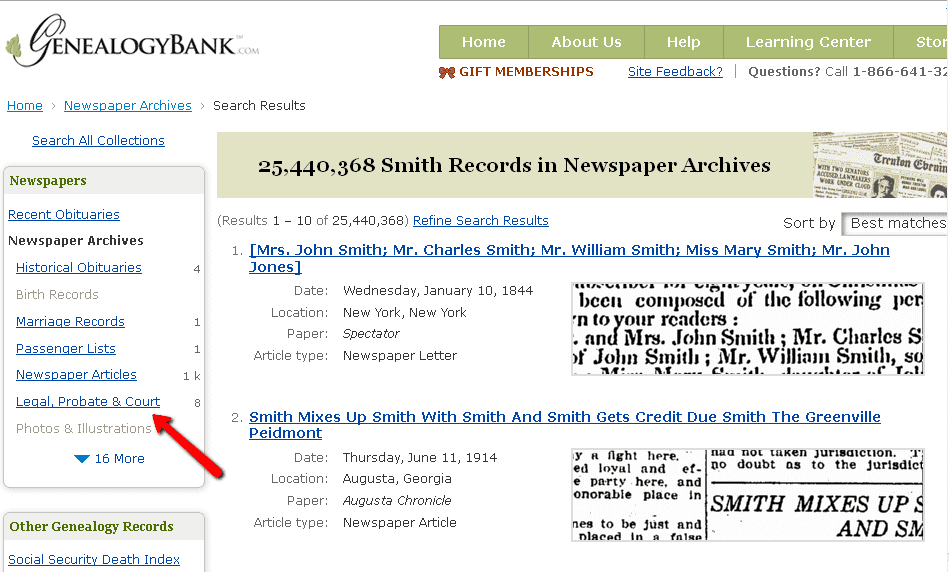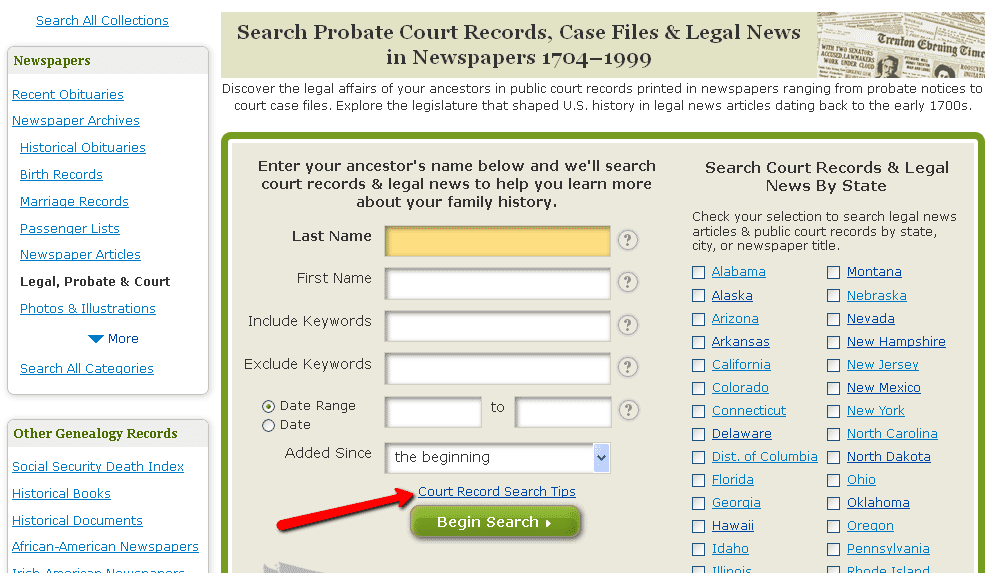Introduction: Gena Philibert-Ortega is a genealogist and author of the book “From the Family Kitchen.” In this guest blog post, Gena shows how those small-print legal notices found in the back of newspapers—often ignored by most readers—can provide important clues to help you break through your genealogy brick walls.
When reading your daily newspapers, are there certain sections you skip over? For many people there is the tendency to skip over the legal notices, typically found in the back of the paper, densely squeezed together and printed in a too-small font. As readers we may think: “why should I read the legal notices?” But as genealogists it would be a mistake to skip over them—they can be a great source of family history information.
Legal notices are notifications placed in the newspaper that alert the community of judicial actions. These can be matters involving estates, divorces, taxes, and land transactions. A 1957 Wisconsin statute states that a legal notice is defined as “…every summons, order, citation, notice of sale, or other notice and every other advertisement of any description required to be published by law or in pursuance of any law or of any order of any court.”* These public legal notices can lead you to records found at the courthouse, a county assessor or recorder’s office, and even additional newspaper articles.
How to Find Legal Notices on GenealogyBank
One way to search for your ancestor in GenealogyBank’s Historical Newspaper Archives is to use the search engine, either the basic or the advanced search, to enter a name, perhaps a place, and even a date or date range. But don’t forget that GenealogyBank allows you to narrow your search results further by article type. Using the list found on the left hand side of your results page, choose the Legal, Probate & Court option to search for your ancestor in legal notices.
Probate Notices in Newspapers
So what is of genealogical value in these legal notices? Plenty. Consider the notices of probate actions. One of my friends was researching her grandfather who had died and left a will. Problem was, the county courthouse serving the area where he died required payment for a search of the probate index—and then, after she paid, responded by telling her there was no court case. She knew there was a probate case because her father had been the executor of the will. So what do you do when an official entity tells you there isn’t a case? I suggested she turn to newspapers and search in the legal notices section. Sure enough, she was able to find the probate case—and with a copy of that legal notice, went back to the court clerks who were then able to provide her with the file.
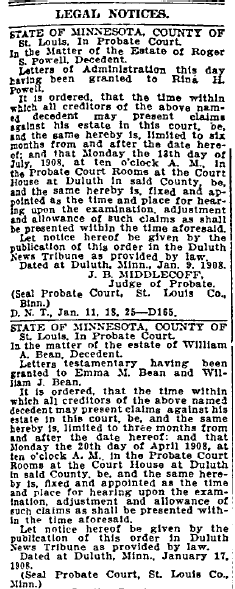
Probate notices in newspapers can provide you names, dates, and information that you can follow up with at the courthouse. In the case of these notices from 1908 in Minnesota, the name of the deceased, the person administering the probate, the judge, and the next court date are listed.
Genealogy Tip: Even if your ancestor left no will, there still could have been a probate case. Did they own land, a home, or owe money? Make sure to check for the existence of a probate.
Divorce Notices in the News
I’ve written about newspaper divorce notices on this blog before (see How to Find Your Ancestor’s Divorce Records in the Newspaper). Divorces notices can show up in various newspaper articles, but don’t forget that a notice requiring an appearance in court will be found in the legal notices. In these examples from 1914 Philadelphia, the defendant is told that their spouse has “filed a libel in the Court of Common Pleas…praying a divorce against you.” Those who do not show up on the date provided in this notice are forewarned “you will be liable to have a divorce granted in your absence.” Notice that in these examples, the court date and address of the defendant are listed.
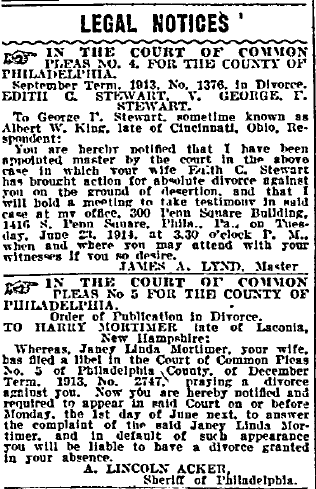
Are you new to court research? On GenealogyBank’s Legal, Probate & Court Records search box, there is a link you can click to get court record search tips.
Trustee’s Sale Notices
One of the genealogical benefits of legal notices is that our women ancestors do appear in these postings. Unfortunately, many of these notices are about the more difficult periods of a person’s life, as in this example of listings of Trustee’s Sales. As you can see, both the wife and the husband are listed in these sale notices. These 1891 examples are a good reminder that our ancestors may have been facing difficult financial times, just as many people faced in the more recent housing market collapse. If you find a notice where your ancestor’s home or property is being foreclosed on, you may want to conduct additional research to determine if there was a larger economic collapse that affected their lives. While we are most familiar with the Great Depression of the 1930s, other similar economic crises have happened in U.S. history. For example, two years after these newspaper notices appeared, there was a financial panic in 1893 that included the closing of many banks and high unemployment rates.
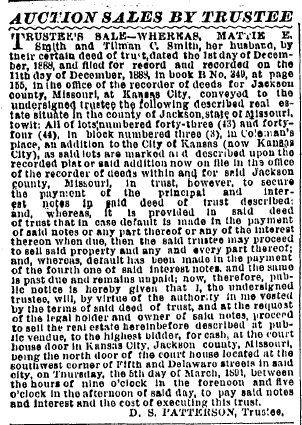
Legal notices in newspapers help tell the story of our ancestors’ lives. While they are often ignored, these legal notices contain rich information including names, street addresses, and dates with the court that can help us find additional documentation to fill out the details on our family trees.
________
*Burke, James J. Wisconsin Statutes, 1957: Embracing All General Statutes in Force at the Close of the General Session of 1957. Racine, 1957, p. 3551.
Related Legal & Court Record Articles:

